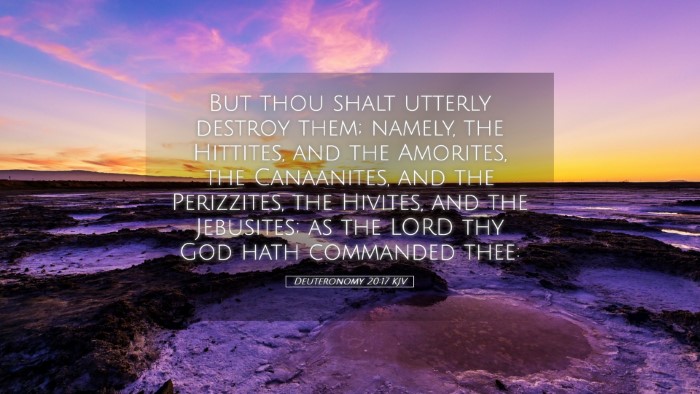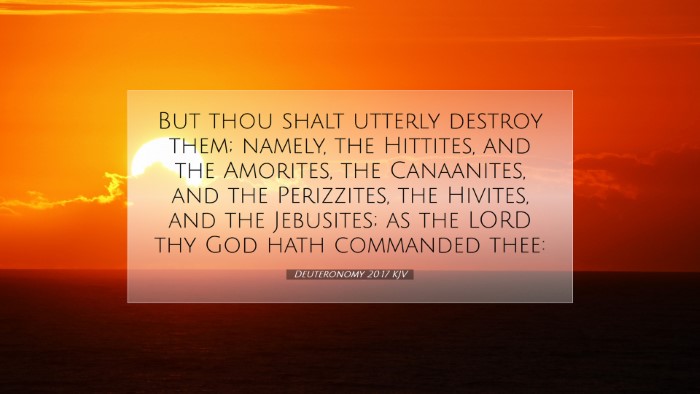Commentary on Deuteronomy 20:17
Deuteronomy 20:17 (ESV): “But you shall devote them to complete destruction, the Hittites and the Amorites, the Canaanites and the Perizzites, the Hivites and the Jebusites, as the Lord your God has commanded you.”
Contextual Overview
In the book of Deuteronomy, Moses provides the Israelites with guidance on various matters as they prepare to enter the Promised Land. Chapter 20 discusses laws regarding warfare, emphasizing how the Israelites are to conduct themselves in battle against the nations inhabiting Canaan. This command, though challenging, lays the foundation for understanding God’s covenant relationship with Israel and His judgment upon the nations.
Theological Significance
This verse embodies a core principle of divine justice and the sanctity of God's commands. The command to “devote them to complete destruction” indicates God’s displeasure with the practices of these nations, which included idolatry and immorality. They had crossed a threshold of wickedness that warranted divine judgment.
Insights from Public Domain Commentaries
Matthew Henry's Commentary
Matthew Henry highlights that this divine injunction was not made out of arbitrariness but was a response to the cumulative iniquities of these nations. He notes, “Their sins had cried aloud for vengeance, and this was the time of their reckoning.” In the historical context, Henry argues that God's sovereignty over the nations justified Israel’s actions, presenting it as a divine mandate rather than mere human ambition. He reinforces the concept that obedience to God’s command is paramount for Israel’s future stability and spiritual integrity.
Albert Barnes' Notes on the Bible
Albert Barnes elaborates on the types of inhabitants enumerated in the verse—Hittites, Amorites, Canaanites, Perizzites, Hivites, and Jebusites—identifying them as representative of pagan influences that posed a spiritual danger to Israel. He states, “Their complete destruction was necessary to prevent their corrupting influence upon Israel.” Barnes emphasizes that the rationale behind total destruction was to maintain Israel’s holiness before God and preserve them from idolatry, which led to covenant disobedience.
Adam Clarke's Commentary
Adam Clarke tackles the potentially troubling implications of such a command, explaining that it reflects God’s justice and the seriousness of the covenant. Clarke asserts that the eradication of these nations serves as a “divine warning against every form of idolatry and immorality.” He interprets this as the high stakes involved in the covenant and observes how failure to execute this command could lead Israel into the very sins that led to the destruction of these nations. He posits that it was ultimately for the sake of both Israel and those nations that such a command was issued.
Ethical Considerations
The harshness of the command raises contemporary ethical dilemmas regarding warfare and the treatment of enemies. Many scholars grapple with how to reconcile divine commands with moral principles. The theological assertion is that God’s command was sovereign, and that the destruction was both a judgment and a means of protecting the sanctity of His chosen people.
- Judgment: Many theologians, including Henry, affirm that these acts were seen as the realization of divine judgment against pervasive idolatry.
- Preservation: The preservation of Israel’s religious identity was paramount to God, as seen in Barnes' emphasis on the potential corrupting influence of these nations.
- Historical Context: Clarke offers historical context, suggesting that the situation was unique to the ancient Near Eastern context of warfare and divine command.
Applications for Today
While the immediate historical and cultural contexts differ greatly from the present, there are significant lessons that emerge from this text for contemporary readers, pastors, and theologians:
- Holiness: The centrality of holiness in the life of a believer. Just as ancient Israel was called to be separate, so are modern believers called to a life set apart for God.
- Obedience: The importance of obeying God’s commands, recognizing that divine directive is aimed at our overall well-being and relationship with Him.
- Moral Clarity: A need for moral clarity and discernment in dealing with influences that could lead believers away from the truth of the Gospel.
Conclusion
Deuteronomy 20:17 presents a challenging yet profound command that underscores the seriousness of God’s covenant with His people. Through various commentaries, we see a blend of historical context, theological significance, and ethical considerations that enrich our understanding of this verse. It poses important questions about faithfulness, identity, and the ongoing call for believers to uphold God's standards in a world filled with competing ideologies and practices.


